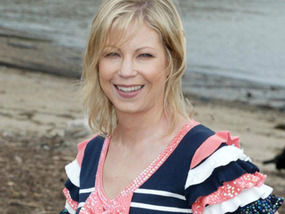Emma McDonnell | Contributing Writer
This month, Trinity Cancer Soc invited eight-time cancer survivor Emma Hannigan to speak about her battles with the disease. She was also presented with the TCD Cancer Society Inspirational Person Award.
Emma was preceded by Adrian Bracken, a genetics researcher at TCD. He spoke about the different cancer genes including BRCA 1 and 2, of which Emma, Angelina Jolie and Sharon Osbourne are all carriers. He highlighted the importance of scientists affiliating with healthcare professionals so that cancer treatment can be seamlessly brought from “bench to bedside”.
Adrian also mentioned the future of cancer treatment, something which he and his colleagues are particularly enthused by. The concept of personalised medicine is one that cancer researchers are striving to achieve. He explained that there is no all-encompassing cancer treatment suitable for every sufferer and that the aim is to create a personalised treatment depending on the unique nature and severity of the disease.
Moving on from the scientific facts of the matter, Emma spoke next. Simply put, this woman is an inspirational figure. She certainly doesn’t strike you as someone who has spent the last eight years of her life waging a continuous war with cancer. A beautiful woman with an endearing and relentless sense of hope, Emma seems affected but in no way consumed by her illness. She is not bitter at what she has suffered and her illness is not a defining element of her life. Admitting she’s the one to laugh at funerals, always says the wrong thing at the wrong time- it’s easy to identify with her. Illness and suffering are not stigmatised, instead she describes her experiences openly.
As Emma frankly put, “cancer doesn’t have a social conscience”.
Emma’s battle began in 2005 when she discovered she was a carrier of BRCA1. This deadly gene is inherited; Emma’s mother and other female relatives are carriers and her aunt died of cancer as a result of the gene. Emma was given the ultimatum of careful monitoring or radical surgery that would reduce her chance of cancer to just 5%.
Considering she had the bleak outlook of an 85% chance of developing breast cancer and a 50% chance of ovarian cancer, she opted for the subsequently life-saving surgery. In 2006, she had a bilateral mastectomy, reconstructive surgery and both of her ovaries removed in an attempt to ward off future advances by the disease. As Emma frankly put, “cancer doesn’t have a social conscience”. Following this surgery, she was diagnosed with an auto-immune disease, suffered numerous infections and complications, and continued to be stricken with cancer another seven times.
As a coping mechanism during her gruelling illness, Emma began writing about her experiences but it was more akin to a “shitty version of Bridget Jones Diary in hospital” than an epic. She graduated to writing fiction stories which afforded her a sense of escapism from the grim reality of drips and stitches. Her friend, novelist Cathy Kelly encouraged her to send the works to be published. She has since written six fiction novels and a candid memoir, Talk to the Headscarf.
Witnessing medical advances is one of the good points of her ongoing battle. Currently on an ongoing chemotherapy treatment as a preventative measure, what keeps Emma going is hope. She has faith in cancer researchers and has seen her own battles become slightly easier each time as medicine develops. She speaks with authority and believes scientists are on the cusp of discovering a cure to the disease.
Defiant in her approach, Emma offers hope to all those affected by cancer. “I am proof that cancer doesn’t win ALL the time”.







